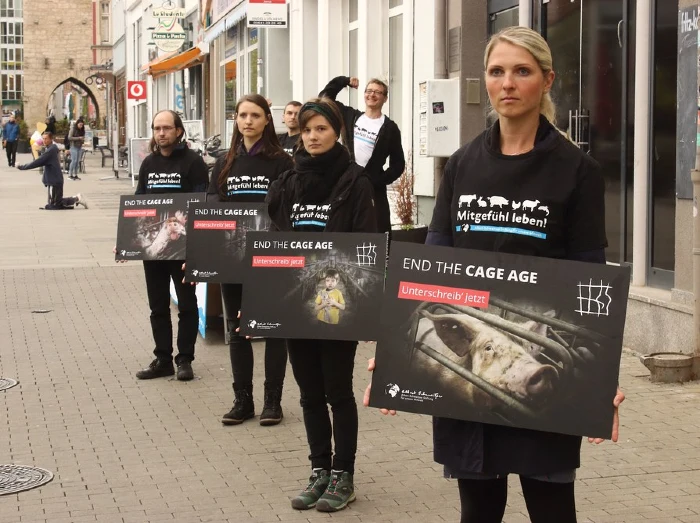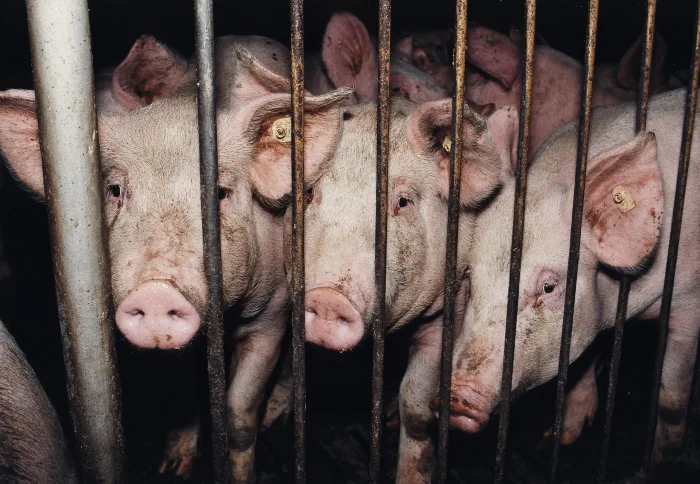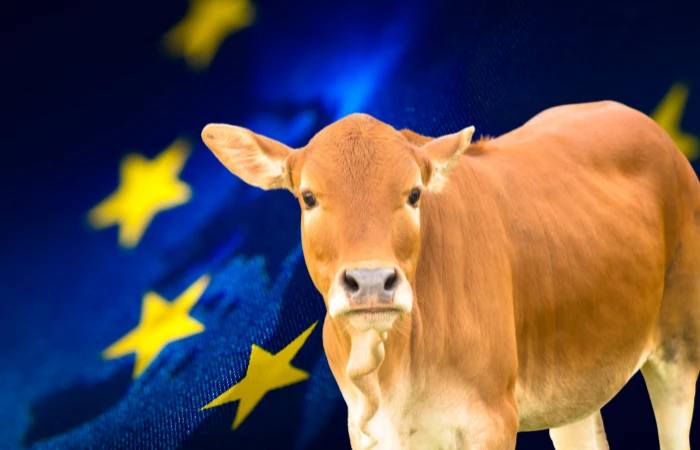The European Union, once hailed for its proactive stance on animal welfare, now finds itself amid a heated debate. Notably, several eagerly awaited EU animal welfare proposals have inexplicably gone off-track, leaving many to speculate on the underlying reasons.
In recent times, the European Commission seems to be treading lightly around these issues, sparking speculations following leaks that suggest the Commission may be considering discarding the proposals. The underlying motive is believed to be an attempt to counter the rising food costs and inflation that are currently challenging the continent’s economies.
Advocates for animal rights are voicing their concerns, accusing policymakers of taking a drastic U-turn on previous commitments. These sentiments come in the wake of the European Commission’s vow to “End the Cage Age” just a few years ago—a commitment that echoed the sentiments of a significant portion of the European populace.
The “End the Cage Age” initiative, championed by citizens, garnered the support of close to 1.4 million signatures in 2020. This powerful demonstration of public opinion propelled the Commission to draft legislation that would pave the way for phasing out cage systems for various animals, including hens, rabbits, and ducks, by 2023.
The promised legislative changes were aimed at eradicating several other inhumane practices. This included discontinuing the slaughter of day-old chicks, halting the sale and production of fur, and significantly reducing the distances live animals are transported.
However, with these proposals now hanging in the balance, many are questioning whether the EU is prioritizing economic relief over animal welfare.

European Commission's Muted Stance on Animal Welfare Raises Eyebrows
The mounting anticipation surrounding the European Union’s animal welfare legislation has recently been met with growing uncertainty and skepticism.
As the time for action drew near, speculations surrounding the legislation’s future began to surface. Most tellingly, the matter was conspicuously absent from European Commission President Ursula von der Leyen’s recent State of The Union address, an oversight noted by numerous animal welfare NGOs.
European Commission Executive Vice-President Maroš Šefčovič, tasked with supervising the European Green Deal, further fueled these speculations. During a European Parliament hearing, Šefčovič’s hesitancy to provide a clear deadline for the animal welfare initiatives was evident. Though he repeatedly emphasized their importance in the Commission’s future agenda, concrete details remained elusive.
In a subsequent communication on World Animal Day, Šefčovič informed MEPs of plans to introduce proposals safeguarding animals during transport by December 2023. However, he refrained from providing a concrete timeline for other pivotal animal welfare issues. His message underscored the Commission’s ongoing commitment to these matters, yet specifics were scant.
Prominent animal welfare entities, including FOUR PAWS International and Compassion in World Farming, quickly voiced their dissatisfaction, suggesting the Commission’s actions fell short of its initial promises. Compassion in World Farming went as far as to claim that the Commission’s about-face on animal welfare reform undermines both democracy and the European vision.
So, what might be influencing the European Commission’s apparent change in course?
While the Commission has remained tight-lipped regarding its motivations, media sources, including the Financial Times, hint at economic concerns, particularly fears that the proposed animal welfare measures could exacerbate the ongoing food inflation crisis. An impact assessment draft allegedly indicates potential surges in farming costs by up to 15%, resulting in higher consumer prices and augmented imports.
Yet, these economic apprehensions seem slightly misplaced. Recent data from Eurostat indicates that food inflation, though still elevated, has begun to stabilize. Additionally, even if greenlit, these proposals would necessitate years for legislative incorporation and implementation, diminishing immediate inflationary concerns.
Joe Moran, FOUR PAWS’s Director of European Policy, weighed in, emphasizing that these remain proposals and would require an extensive period for actual implementation post-adoption, possibly stretching into 2027 or 2028.
The Implications of the EU's Animal Welfare Proposals on International Trade and Beyond

The discourse surrounding the European Union’s animal welfare legislation recently took an intriguing twist. Joe Moran, FOUR PAWS’s Director of European Policy, drew attention to the typical transition periods for such measures, which usually span a decade or more. He compared shelving present-day legislation due to projected costs spread across the next 20 years to cancelling a vacation planned a decade in advance because of current inclement weather. In his words, “It literally doesn’t make any sense at all. It’s bonkers.”
Moran posited that the decision to abandon the animal welfare initiatives might not be solely rooted in immediate financial concerns. He suggested that the broader optics, particularly concerning the European Commission’s ongoing negotiations for the EU-Mercosur trade deal with nations like Argentina, Brazil, Paraguay, and Uruguay, could be influencing the decision. The timing of the legislative reforms, especially their potential to cast a shadow on the trade deal, might be of particular concern.
A leak from April 2023 underscored Moran’s suspicions. The document revealed that nations likely to be most impacted by the heightened welfare standards included Brazil and Thailand for poultry meat and Brazil, Argentina, and Uruguay concerning beef. The heightened standards for animal welfare could clash with the interests of these countries, making trade negotiations more tenuous. Moran expressed concerns that unveiling such stringent requirements during trade talks could be seen as a risk, especially if South American imports were mandated to adhere to the same welfare standards. The European Commission might perceive this as a potential deal-breaker.
Moreover, Moran emphasized that the animal welfare reforms were well on their way to progression, nearing the inter-service consultation phase, with the potential for public release just weeks away. He questioned the reasoning behind the sudden reluctance to make them public.
Highlighting the fundamental tenets of democracy, Moran advocated for transparency in the process. He stated, “A proposal is only a proposal… We’re asking them simply to put these texts in the public domain in front of MEPs, in front of member states.” In his view, allowing amendments, changes, and open discussions aligns more with democratic principles than discreet, behind-the-scenes deliberations.
More To Discover
- Advocates Seek an End to Canadian Horse Meat Market: The Complexities of a Controversial Issue
- Lasers Can Transform Poultry Farming for Better Chicken Health, Welfare, And Flavor
- UK’s Chicken Industry in Crisis: 80 Million Deaths Point to Unsustainable Practices
- The Future of Eggs Is Here: Precision Fermentation Means Flocks Won’t Need To Produce Eggs
The Future of Animal Welfare in the EU: What Really Lies in the Balance?
The conversation on the EU’s anticipated animal welfare proposals brings forth not just economic or diplomatic considerations but delves deep into the heart of ethical and safety issues surrounding livestock farming. The director of FOUR PAWS’s European Policy, Joe Moran, underscores the gravity of what’s truly at stake.
Moran brings to light the stark realities that these reforms aim to address, including the urgent need to end practices such as the castration of piglets without anesthesia, the early separation of calves from their mothers, and the accelerated growth rates of chickens to the extent that their own legs can’t support their body weight.
The interrelationship between the welfare of farmed animals and the safety of the food chain is corroborated by the European Food Safety Authority. It highlights a direct link between the well-being of animals and the safety of the foods derived from them. Stressed animals with compromised welfare are more prone to contracting and transmitting diseases, presenting not only an ethical concern but a tangible threat to food safety.
Nevertheless, it’s essential to recognize that the European Union maintains an unparalleled standard in animal welfare. Widely regarded as the gold standard globally, the EU’s commitment to animal well-being ensures that food safety concerns are minimal within its borders.
However, Moran was quick to highlight that while the EU stands tall as a leader in many facets of animal welfare, it doesn’t hold a monopoly on best practices. There are regions worldwide, for instance, that have introduced regulations such as the prohibition of live animal exports, setting precedents that the EU has yet to follow, even if these countries’ comprehensive welfare regulations might not match the EU’s.
For the European Union to fortify its leadership position in global animal welfare, Moran argues that adopting these proposals isn’t just beneficial but imperative. In his words, “If we want the EU to continue to be the world’s leader in animal welfare, we need these proposals now.” The sentiment suggests that leadership isn’t solely about setting standards, but continually evolving them in the face of new challenges and knowledge.















